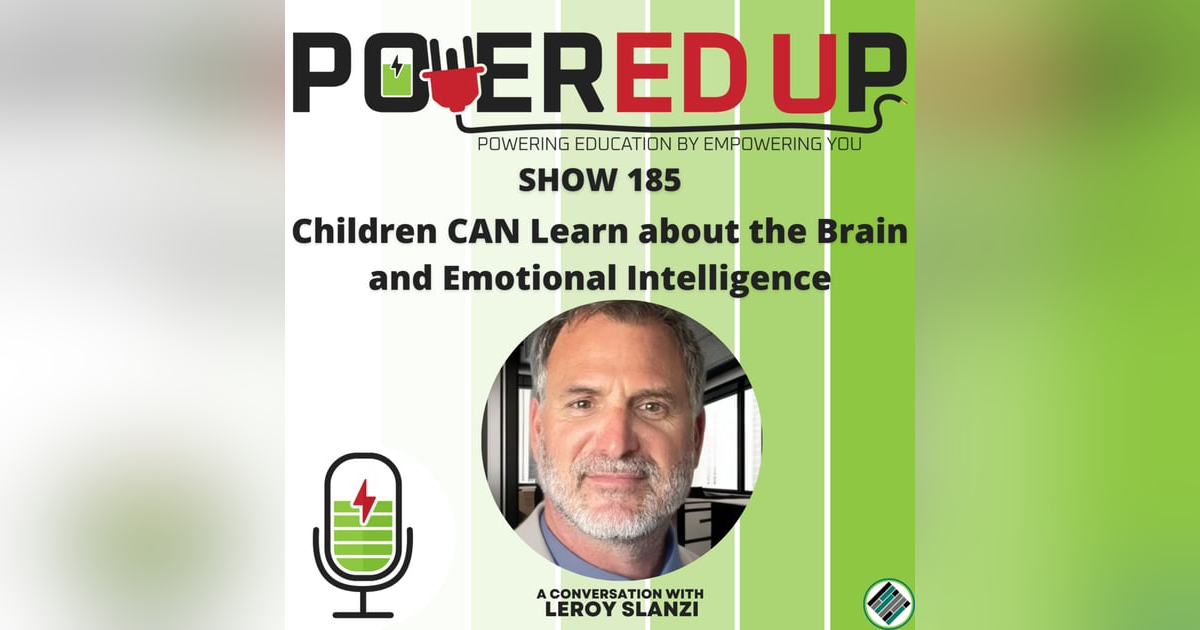185: Children CAN Learn about the Brain and Emotional Intelligence

In this conversation, Leroy Slanzi discusses the importance of emotional intelligence in education, sharing insights from his 25 years of experience in various educational roles. He emphasizes the need for early emotional education, the impact of technology on students' emotional development, and practical strategies for teachers to foster emotional intelligence in their classrooms. Slanzi advocates for a holistic approach that includes parents and highlights the significance of teaching children about their emotions and how to manage them effectively. In this conversation, Leroy Slanzi discusses the importance of emotional intelligence and mindfulness in education. He emphasizes the need for a common language among educators and students to foster a culture of understanding and respect. Slanzi shares insights on embedding emotional intelligence into the curriculum, the impact it has on student behavior and academic success, and the importance of creating a supportive school environment. He also highlights the value of integrating indigenous practices and encourages educators to stay curious and innovative in their teaching methods.
Takeaways
-
Emotional intelligence is crucial for building relationships in education.
-
Technology has negatively impacted students' emotional skills.
-
Starting emotional education in kindergarten is essential.
-
Parents often struggle to monitor their children's technology use.
-
Children can teach parents about emotional intelligence.
-
Teachers should embed emotional intelligence in everyday lessons.
-
Breathing techniques can help students regulate their emotions.
-
Creating a calming space in schools supports emotional well-being.
-
Conflict resolution skills are developed through play.
-
Emotional intelligence should be a school-wide initiative. Emotional intelligence fosters a culture of mindfulness in schools.
-
Students who understand their emotions are more successful.
-
Embedding emotional intelligence into lessons enhances learning.
-
Creating a common language among staff and students is crucial.
-
Proactive measures in education can mitigate behavioral issues.
-
Teachers should respect students' intelligence and capabilities.
-
Outdoor and experiential learning are vital for student development.
-
Emotional intelligence can lead to improved academic performance.
-
Building relationships with students is essential for their success.
-
Educators must remain curious and continue learning.
Chapters
00:00 Introduction to Emotional Intelligence in Education
02:58 The Evolution of Emotional Intelligence Awareness
06:08 Technology's Impact on Emotional Development
08:56 Building Emotional Intelligence from Kindergarten
11:50 The Role of Parents in Emotional Education
14:52 Strategies for Teaching Emotional Intelligence
18:11 Breathing Techniques for Emotional Regulation
20:48 Creating a Supportive Classroom Environment
24:04 Real-Life Applications of Emotional Intelligence
30:23 Building a Culture of Mindfulness
32:12 The Role of Emotional Intelligence in Education
35:52 Embedding Emotional Intelligence in Curriculum
38:13 The Impact of Emotional Intelligence on Academic Success
40:59 Creating a Supportive School Environment
43:27 Integrating Indigenous Practices in Education
46:50 Key Takeaways for Educators
49:26 Advice for Innovative Teaching
Website: www.leroyslanzi.com , www.emotionalschools.com
Help us out!
Help us reach new listeners on iTunes by leaving us a rating and review! It takes just 30 seconds, and instructions can be found here. Thanks! We appreciate it!







